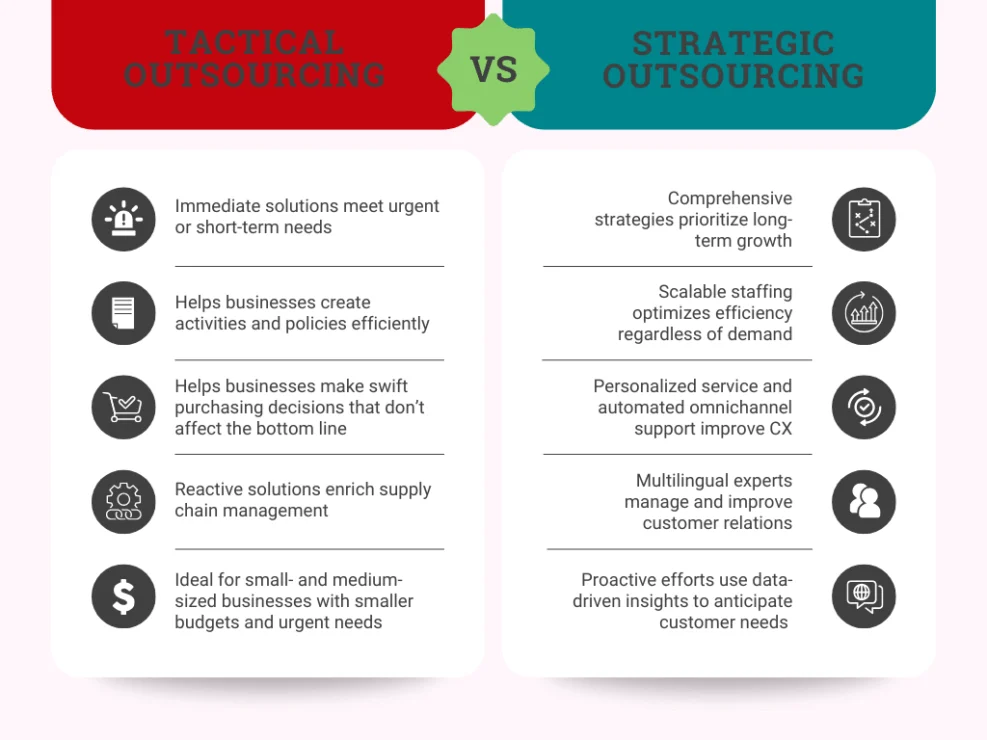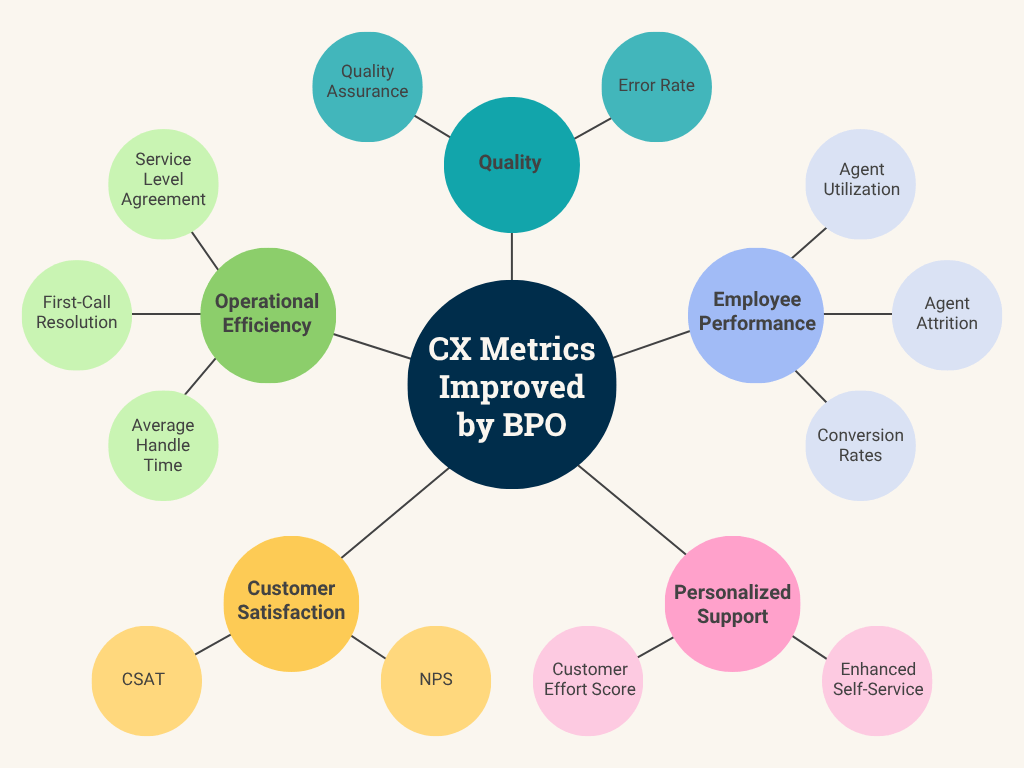Read Time: 10 minutes
Table of Contents
Introduction
Businesses of all sizes are facing a growing need for operational efficiency in eCommerce. In-house teams are difficult to scale, emerging eCommerce BPO providers are helping companies achieve sustainable growth with strategic, custom solutions.
eCommerce BPO is when online retailers contract with a third-party provider to handle certain operations, alleviating workloads from internal teams. An eCommerce BPO provider specializes in customer support operations and offers specific services to enhance customer experiences. eCommerce BPO services include order processing, return management, advanced technology and other targeted solutions to empower scalability.
In this blog, you’ll learn how to access these core benefits of eCommerce outsourcing:
- Multilingual support expertise
- Expanded hours with 24/7 availability
- Advanced technology integrations for data-informed insights
- Real-time tracking and post-interaction analytics
- Enhanced self-service options
- Customer journey mapping
- Reduced operational costs and increased opportunities for revenue growth
- Enhanced customer satisfaction and retention
- And many more!
More companies are turning to experts for outsourced eCommerce operations to keep up with the trends that are revolutionizing the industry. AI technology is enabling companies to understand and serve customers better than ever, powering scalable growth that keeps up with and anticipates rising customer expectations.
Key takeaways
- eCommerce BPO enables scalable, cost-effective growth by offloading core operations to specialized providers, allowing in-house teams to focus on innovation and strategy.
- Strategic outsourcing goes beyond cost savings by enhancing customer experiences through 24/7 multilingual support, advanced technology integrations, and data-driven insights that improve satisfaction, retention, and brand loyalty.
- Look for expertise in customer experience, flexibility in staffing, proven technology solutions, and a strong commitment to compliance, performance, and partnership alignment.

Strategic vs. tactical outsourcing: Why eCommerce BPO matters
Strategic outsourcing supports internal teams by handling omnichannel interactions and support requests, empowering the in-house team to focus on daily operations and business or product development. The BPO provider uses remote workers in onshore, nearshore, or offshore countries in a scalable staffing model that allows businesses to seamlessly manage their workforce amid slow and busy seasons.
Strategic outsourcing focuses on long-term growth.
Experts take proactive measures to customer care by upselling, cross-selling, developing relationships with customers, and managing the customer experience to adapt to ever-changing customer needs.
On the other hand, in-house operations rely on fulfilling immediate tactical or short-term needs. Often reactive, tactical outsourcing helps businesses create activities and policies efficiently and make swift purchasing decisions that don’t affect the bottom line.
A tactical approach is ideal for small- and medium-sized companies with smaller budgets and urgent needs.
The right eCommerce BPO partner can revolutionize a business, not just by handling support requests and managing queues but also by providing valuable insight into strategies that enhance customer satisfaction, engagement, and loyalty. Strategic personalized support will set your business apart in a crowded industry, leaving a lasting impact as an industry leader with a customer-centric approach.
Core eCommerce BPO services offered
While the scope of eCommerce call center solutions is growing to include more meaningful and dynamic solutions, it all starts with core BPO services that optimize the efficiency of your customer care. Dedicated agents take ownership of these operations so your team can prioritize daily tasks with their specialized skills. Learn how experts are optimizing these core functions to level up your search for an eCommerce BPO partner.
Customer service and support
Picture this: Seasonal demand surges overwhelm your internal team. The phone is constantly ringing, issues take too long to resolve, and burned out employees deliver inconsistent levels of service as they struggle to keep up with all the different ways customers are engaging with your company. Customer satisfaction wanes and churn increases, threatening business success.
eCommerce customer service outsourcing resolves all of these issues with just a few key strategies.
- Tailored staffing expands your hours of coverage in the languages you need, reducing overhead costs.
- Advanced technology integrates with existing systems to securely handle information in email, chat, social media, and phone interactions.
- Automations and self-service options provide 24/7 support, reducing queues and wait times and increasing satisfaction.
- Customer support experts train in your brand and map the customer journey for personalized service.
Order management and fulfillment
Support teams do more than just handle complaints. An eCommerce order fulfillment BPO provider can fulfill and manage orders, keeping track of inventory in customizable, secure, user-friendly technologies.
Outsourcing enhances your business-to-business, or B2B, relationships through enhanced communication and streamlined processes. eCommerce BPO companies manage third-party logistic coordination, optimizing your supply chain with efficient and professional processes.
Operational expertise ensures the secure end-to-end handling of complex logistics, taking the stress and high costs out of order fulfillment.
Returns management
While traditional logistics focuses on the flow of products from manufacturers to consumers, reverse logistics is, well, the reverse: the process of moving goods from the point of final consumption back to the seller or manufacturer. Reverse logistics includes these activities:
- Returns
- Repairs
- Recycling
- Proper disposal of products
Outsourced eCommerce operations focus on streaming these activities. Enhanced self-service empowers customers to initiate processes on their own timeline, improving the customer experience and encouraging customers to continue returning to your business.
Back-office tasks
Outsourced teams can handle your non-client facing administrative and back office support functions. They can include these tasks:
- Data entry and management
- Report creation and management
- Fraud detection
- Bookkeeping
- Accounting
- Record maintenance
- IT services
- Regulatory compliance
These essential services keep your business running and provide support for internal teams and customers. An eCommerce BPO provider can enhance the security and efficiency of your systems through advanced technology, continuously improving AI models, and dedicated care from specialty experts.
Want to scale your business?
Global Response has a long track record of success in outsourcing customer service and call center operations. See what our team can do for you!
Key benefits of eCommerce BPO
eCommerce BPO services target specific challenges with data-driven strategies that are proven to work. They position your business for immediate and long-term success by driving high-quality results in customer experiences and operational functionality.
Partner with an expert equipped with the tools, expertise, and passion to achieve these key benefits of eCommerce BPO.
- Reduced operational costs: Expert remote teams are equipped with the hardware they need to begin working, with minimal training time and costs.
- Scalable infrastructure during seasonal peaks: Predictive analytics help you manage your workforce and anticipate urgent hiring needs.
- Improved customer satisfaction and Net Promoter Scores: State-of-the-art platforms provide a 360-degree view of customer issues, preferences, and wishes, empowering you to make decisions that resonate and boost satisfaction.
- Access to specialized talent and tools: Tap into a constantly updated global pool of agents staying up-to-date in breakthrough technology and processes that pack a punch.
- Enhanced speed-to-market for growing brands: Consult with industry experts for assistance in idea generation, design, prototyping, production, and market launch for a competitive edge in an evolving landscape.
eCommerce BPO use cases
Discover how eCommerce customer service outsourcing works in real life. These stories demonstrate the potential impact outsourcing can have on real customers, improving processes and achieving impressive results for industry leaders.
Direct-to-consumer brand scaling
Rack Room Shoes struggled to scale operations as their Facebook fan base grew by 500% in two years. They turned to Global Response for a custom flexible solution that integrated marketing with customer care, public relations, and leadership — a strategy that proved crucial for the success of Global Response’s social media monitoring program.
Read the full case study to see how the team extended coverage to holidays and weekends, increasing hours of coverage by 110%, while helping the brand save 84% on social media monitoring.
Global brand support entering new markets
Shopify and Amazon are just two examples of platforms that help small businesses and emerging sellers break into markets with limited internal staff. While not BPO services, Shopify and Amazon incorporate BPO-like functions into operations and facilitate outsourcing, enabling businesses to contract with BPO providers for inventory management, customer service, and marketing.
Shopify provides access to global specialists who can handle various eCommerce operations, ensuring small businesses can meet the needs of their growing customer bases.
Core product development
Small business and startups also require specific focus on product development, and partnering with a BPO provider can be the smartest strategy to streamlining processes from the get-go. The partnership will help these businesses keep costs low while accelerating their time to market, providing valuable insights in navigating eCommerce as industry experts.
Ask your potential BPO provider if they can help with these key stages of product development:
- Idea generation
- Screening and evaluation
- Concept development
- Market research and testing
- Product design and development
- Testing and validation
- Market launch and evaluation
Of course, this is just the beginning. An end-to-end BPO partner will also help you enhance the customer experience by conducting vital follow-up and feedback, evaluating results and satisfaction in customer surveys and omnichannel monitoring.
Choosing the right eCommerce BPO partner
Your BPO partner can make or break operations. Efficiency isn’t just the goal; it should be the standard, the jumping point for greater success. Look for these key features in an eCommerce BPO partner to ensure they can achieve the results you seek:
- Customer experience (CX) expertise: They should know how to map customer journeys and optimize touchpoints, using proven methods to boost satisfaction.
- Industry knowledge: They should know the innovations in technology and CX solutions that help companies understand and serve audiences when and how they need it.
- Flexibility: No support solution is one-size-fits-all. Find a BPO partner who can tailor solutions to your needs and provide flexible solutions (for example, in staffing) to optimize operations amid a fluctuating market.
- Compliant operations: One quality that demonstrates expertise is how well a provider follows laws and regulations applicable to your business. Compliance adherence should be incorporated into all operations.
Ask these questions to evaluate if a potential BPO vendor is the right fit for your eCommerce business:
- What services would you suggest for my specific challenges?
- What is a case study you can provide that demonstrates your success in achieving the results I seek?
- What security and data protection measures do you take for eCommerce businesses?
- What technology and infrastructure plans would you implement for my business?
- How do your values align with mine, and how would they affect my new support team?
- How do you use AI technologies to streamline training and support operations?
- How do you evaluate performance and determine success?
- What certifications do you hold?
- How do your technology solutions integrate with my existing systems?
- What communication measures would you take for our partnership?

How eCommerce BPO impacts customer experience
Outsourcing is not only reacting to changes in customer experience; it’s actively shaping it. As CX strategies aim to optimize experiences with more nuance, swiftness, and effectiveness than ever before, customers are responding with higher expectations and more customer loyalty. The key? Personalized support through outsourced teams. Follow the strategy through these stages to see the effect of outsourcing on customer experience:
- Outsourcing connects businesses with smart technology that tracks and analyzes customer sentiments.
- These data-informed insights help companies achieve a more nuanced understanding of emerging trends.
- Automated assistance empowers faster resolution times, raising customer satisfaction.
- Multilingual agents handle complex issues with patience and contextual knowledge in conversation histories.
eCommerce BPO trends to watch in 2026
Looking toward the future is a necessity in customer experience management. Industry-leading BPO providers will have these hot topics on their minds in 2026:
- AI-powered chatbots and automation: Understanding how customers use and feel about AI support solutions.
- Omnichannel integration: Tracking evolving sentiments and managing various requests through all channels in one unified platform.
- Environmental and social governance in outsourcing: How outsourcers integrate sustainability, social responsibility, and ethical governance into operations, and how ESG-conscious strategies enhance the reputation of businesses using them.
- Nearshore BPO for eCommerce: Cost efficient, culturally aligned teams vs. more cost savings in a larger talent pool in offshore solutions.
Your BPO partner should apply nuance to these topics and more as they determine their relevance to your business.
Conclusion
eCommerce BPO strategies are some of the most effective uses of outsourcing. eCommerce call center solutions can optimize internal operations, back-office tasks, and B2B relationships while enhancing customer experiences and managing support requests.
Beyond that, a BPO provider is a key partner in scaling eCommerce operations. Leverage the expertise of a partner with the tools and vision to grow with you. Contact Global Response today to learn how we could be a fit for your business and your goals.
eCommerce BPO FAQs
eCommerce BPO, or eCommerce Business Process Outsourcing, refers to companies that deliver customized services to eCommerce businesses.
eCommerce BPO helps your business scale by offering flexible hiring solutions, reducing overhead costs, and implementing advanced technology that streamlines processes to enhance efficiency.
You can outsource eCommerce services including inbound and outbound customer support, order processing, inventory management, technical support, and content management.
Yes, outsourced customer service is good for eCommerce brands! Outsourced eCommerce BPO providers give companies access to multilingual industry experts and 24/7 support.
The cost of eCommerce BPO varies depending on the services included, the location of the outsourced teams, and the pricing models of each company. Providers price monthly per agent or per hour and can range from $5 to $50 per hour.
eCommerce BPO is a long-term solution focused on scalable growth by outsourcing business functions to specialized providers, including customer experience experts focusing on customer relationship management. 3PL, or third-party logistics, is a shorter term tactical strategy where a provider manages supply chain management logistics such as warehousing, order fulfillment, and shipping.
Companies should choose an eCommerce BPO partner by researching providers’ services, aligning values, and reading case studies to evaluate performance.




